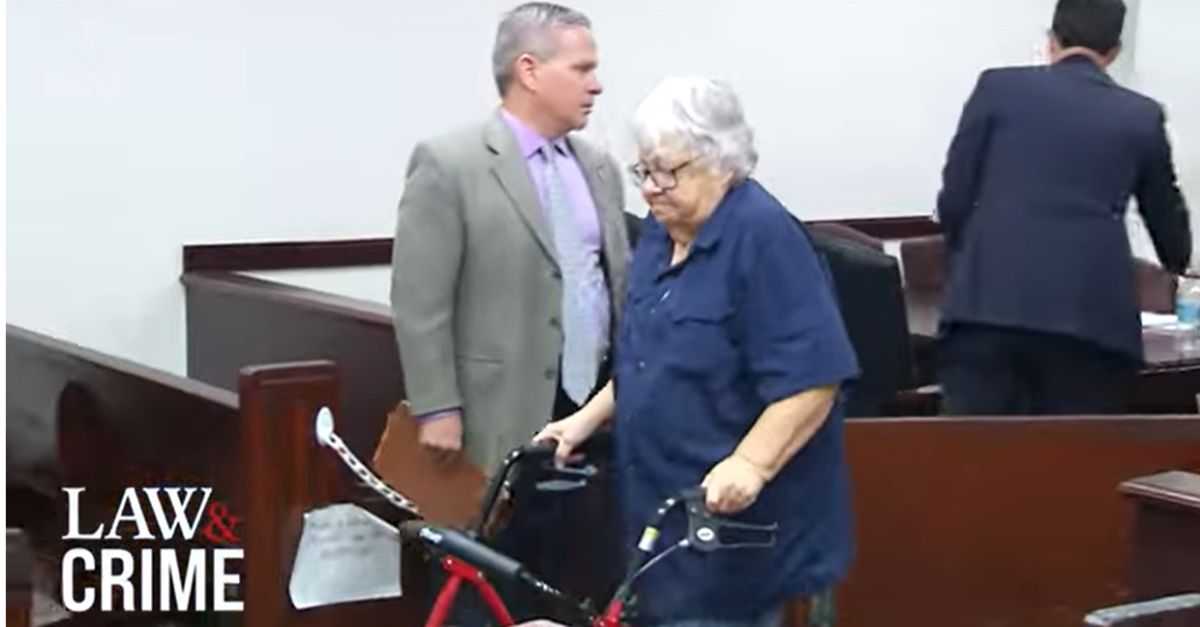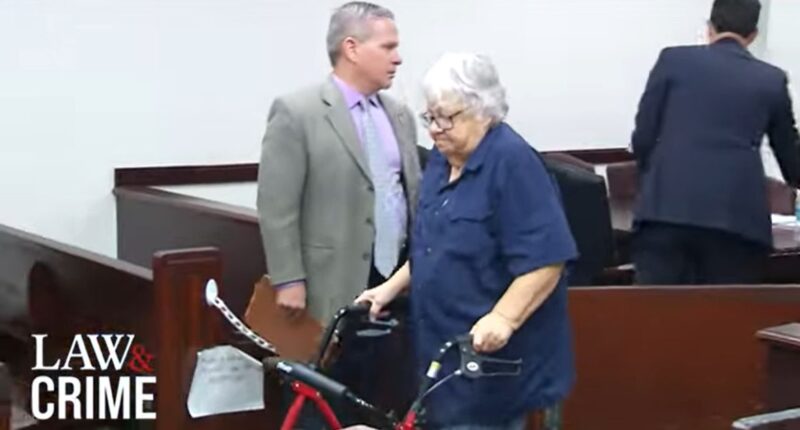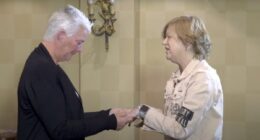
Ellen Gilland (Law&Crime).
The trial date for the woman accused of killing her elderly husband at a Florida hospital in a suicide agreement has been scheduled for early January by a judge on Thursday.
Ellen Gilland, 78, is slated to go on trial on Jan. 6, said Volusia County Judge Kathryn D. Weston. There will be 90 jurors called into court that day and the court hopes to be able to seat a jury by Monday, Weston said. Assistant State Attorney Mark Interlicchio said if all goes according to plan he will rest his case within a day or two.
Gilland was indicted on charges of assisting in self-murder, two counts of aggravated assault with a firearm, and a count of aggravated assault of a law enforcement officer with a firearm in the Jan. 21, 2023, shooting death of her husband, 77-year-old Jerry Gilland at Advent Health Hospital.
On Thursday, the prosecution tried to prevent some of the defense witnesses, including hospital workers who treated Jerry Gilland, from testifying at trial, saying their testimony would “be for the impermissible purpose of eliciting sympathy.”
The hospital staff could testify to the fact that he had expressed a desire to die by suicide while he was being treated. Weston ruled that the hospital staff could testify to the victim’s suicidal ideations because that is central to the defense theory that his wife was acting upon his wishes.
After the roughly 25-minute hearing, court deputies helped Gilland get up, and she flashed a smile as she walked out of the courtroom with the help of a walker.
Daytona Beach police previously said the couple allegedly planned the killing three weeks earlier. Jerry Gilland was supposed to be the actual shooter, but he grew too frail, Daytona Beach police Chief Jakari Young said. A detective testified under cross-examination at a bond hearing that the husband was the person who loaded the gun, and Ellen Gilland held the gun to her husband’s head while he held her wrist, the detective said. The husband lacked the dexterity to carry it out himself, the investigator testified.
But prosecutors argued that Ellen Gilland was a danger to not just herself, but others too. Original charges included first-degree murder. Body camera footage showed responding officers outside the hospital room, where she was holed up after allegedly shooting her husband.
Police had pulled out their guns and repeatedly told her to drop her firearm.
“Tell me what’s going on,” an officer said. “I don’t want to hurt you. We don’t want to hurt you. Tell me what’s going on. Just talk to me.”
According to the charging affidavit, police said they responded to the hospital regarding a shooting. Ellen Gilland was in room 1106 with a gun when officers arrived on the 11th floor. Witnesses claimed to have heard at least one gunshot from inside the room.
“W1 and W2 entered room 1106 and observed the defendant seated on the left side of the patient’s bed,” the affidavit stated. “The defendant was seated with her back to the far wall and the patient bed between her and the entryway of the room. W1 observed the defendant holding a black revolver handgun which she had aimed at W1 and W2. W1 observed the victim laying unresponsive on the bed in a pool of blood.”
Gilland allegedly said she had a gun and told them to leave. Both witnesses said they smelled burnt gunpowder upon entering the room.
Police said they managed to arrest Gilland without anyone else getting shot, but they claim she opened fire one more time.
“The tazer [sic] was deployed [after they used a flashbang], however it was unsuccessful in subduing the defendant,” the affidavit stated. “As the tazer [sic] was fired at the defendant, she fired one round from her handgun which struck the ceiling tiles above the victim’s bed.”
The detective testified that he believed the bullet that struck the ceiling was meant for officers. He claimed that there was a box with 45 live rounds remaining in the hospital room and more than 100 live rounds in Gilland’s vehicle.
A psychiatrist for the defense testified that he did not believe Gilland was a serious danger to herself or others. Her major depressive episode — which was triggered by her husband’s terminal illness — had passed, he said. Two of the woman’s nieces testified they would help care for her if she were released, with one saying the defendant could stay with her. Another niece said she would ensure there were no firearms in the home, and she would help Gilland make it to court hearings.
Admitting that the defendant clearly “loved her husband,” prosecutors described the case as “troubling.” They said, however, that Gilland posed a direct threat to everyone in the hospital when she brought and discharged a loaded weapon inside a full hospital, then pointed the gun at several others before discharging it again.
That bond hearing, which was under the original murder charge, ended with Judge Karen Foxman denying Gilland the chance at release. She posted a $600,000 bond with the lesser charges in the indictment.











